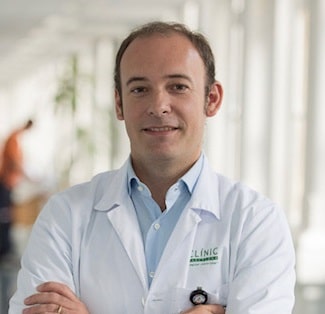Predicting Outcomes in HR positive HER2 Negative Metastatic Breast Cancer
Hormone sensitive breast tumours (HR positive HER2 Negative) make up the majority of all breast cancers.
Predicting outcomes for patients with this disease type, specifically at a metastatic stage, is an area of research for Associate Professor Aleix Prat, who is the Head of Medical Oncology at the Hospital Clinic of Barcelona, Spain.
He said treatments for this group of patients are progressing well.
“In this group of patients, which represents 70% of all breast cancers, we now have a lot of treatment strategies that are improving survival.”
“Not only endocrine therapy which has been here for a while, but now the new inhibitors, the CDK4 and 6 kinds.”
“These drugs are not chemo, they are oral, and in general they’re quite safe and they’re improving outcomes like we’ve never seen before, so this is very good news for those patients.”
“So, today it is the standard of care to combine endocrine therapy with CDK4/6 inhibitors and actually we have three drugs already approved.”
“We’re also starting to see that 40% of these patients have a particular mutation called PIKC3A and that group of patients, in the near future, will benefit from a drug that inhibits this mutation.”
Associate Professor Prat said another area of interest is immuno conduits, which are antibodies that target a specific protein of the tumour and also have chemotherapy incorporated in the drug.
“So, we’re giving little amounts of chemo but chemo that goes directly to the tumour.”
“This is an area that is exploding at this moment with very interesting drugs that are very safe, from a toxicity profile and they’re very specific.”
Listen to the podcast
Associate Professor Aleix Prat explains what research is being conducted into HR+, HER2 negative metastatic disease and how before we can find a cure, researchers are working in the short term to find a way to make it a chronic disease.
Making metastatic breast cancer manageable
Associate Professor Prat said he is optimistic that there is research on the horizon that could reduce the mortality rate in metastatic patients.
“I think we’re going that direction,” he said.
“We already have drugs that are starting to do that and seeing what’s coming, and seeing how much we’re learning about the biology, I have to be optimistic because I think we will get there.”
He said before we can find a cure for metastatic breast cancer, the aim is to make it a manageable chronic disease.
“I think making metastatic breast cancer a chronic disease is an objective that is quite realistic in the short term.”
“To have patients that live with metastatic breast disease, but a well-controlled disease with drugs, like diabetes for example.”
“Of course, how much time it’s going to take to get there, I don’t know, because we need to run the studies, but I think we already have proof that this can happen.”
“So definitely, I’m optimistic and I’m basing this opinion on real data that we are starting to have today of patients that are living for many many years with a disease that is controlled and even some patients who don’t have disease because they have responded so well,” he said.
“The question now is if they are cured or not. We need more follow up for that.”
“The first objective is to make the disease chronic. Definitely curing the disease is our main objective but we must be realistic and curing disease for some patients will be a reality but if we want to make it for a large proportion of patients, I think we need a little bit more research.”
Support Us
Help us to change lives through breast cancer clinical trials research




